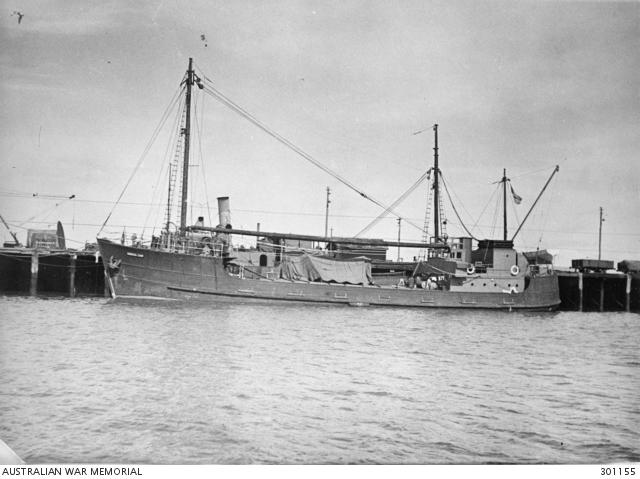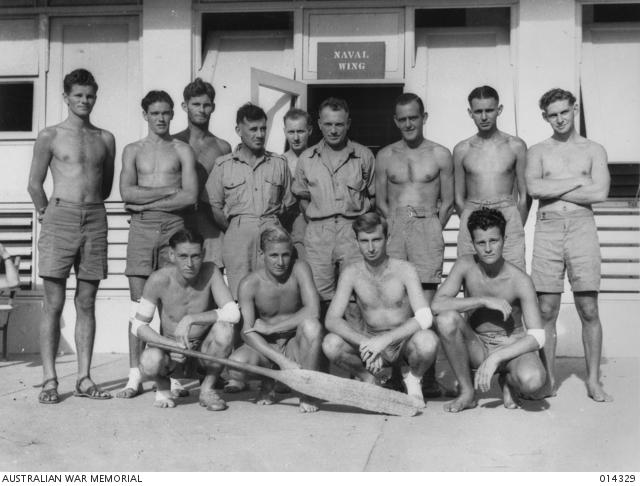'I promised I’d be strong and brave'

Reverend Leonard Kentish was the senior Methodist Missionary in the Northern Territory and was in charge of the local coastwatchers during the Second World War.
Eighty-one-year-old Dr Noel Kentish will never forget the last time he saw his father.
“The memories are very vivid because I promised Dad I would look after mum,” Noel said. “I was just six years old… and I remember him farewelling us on the beach at about midnight… I promised I’d be strong and brave and look after mum – until we could all be together again.”
His father, the Reverend Leonard Kentish, was the senior Methodist Missionary in the Northern Territory and was in charge of the local coastwatchers during the Second World War. Noel was being evacuated from his home on Goulburn Island with his mother, Violet, and two younger sisters, Elaine and Claire, after the bombing of Darwin in 1942.
“The bombing was the 19th of February, and we left in the March,” Noel said. “Dad was trying to get in touch with his regular report to [naval base] HMAS Coonawarra. He wasn’t getting through, so he called one of his colleagues on one of the other islands, and asked, ’What’s happening with Darwin?’ They said, ‘Haven’t you heard? The place was almost cleaned up this morning.’ And he had no idea until then, and that was just after midday, which was when he did his regular report.

Noel Kentish, second from left, with Leonard's grandsons Greg Kentish, Ashley McAlpine and Luke Hearnden.
“He had the radio put on the side of his desk where he did all his study and reading, and … that had pride of place in that corner of the house... I still remember the charts of the United States, Australian and Japanese planes and ships – for identification – and he would get the Aboriginal lookouts to point to [one] if they’d seen it.”
Leonard decided to send his family to stay with his mother in Brisbane.
“Dad said, ‘Look, if we’ve got nothing else happening, I will take it upon myself to get you out of here,’” Noel said. “They were bombing right around the northern end [of Australia, so] it was quite a journey. The lugger Larrpan [which were sailing on] was told, don’t travel during principal daylight hours when [enemy] patrols could be around, and travel only during early morning and late evening hours.”
Just before they left Goulburn Island, the children and their mother posed with their father for what would be their last family photograph.

The last photograph of the Kentish family. Violet and Leonard with their children, Claire, Noel, and Elaine.
“Dad was staying there,” Noel said. “Being a coastwatcher he had the job there on the island of keeping in touch with Darwin… People were a bit scared about the war and what might happen in terms of invasion, because that feeling was in the air all the way through.
“The youngest when we evacuated was 13 months old, [so] it was a very rough sort of trip for her. We knew that the people were looking out for invasion all the time, and the possibility of Japanese patrols and all of that, and the conditions were very rough and primitive. [After the lugger Larrpan], we travelled on corrugated roads on the back of army trucks… They were quite scary times.”
Less than a year later, their lives changed forever when Leonard boarded auxilliary transport ship HMAS Patricia Cam to deliver updated code books to coastwatchers off the north coast of Australia.
At noon on 22 January 1943, the ship was attacked while sailing between Elcho Island and Marchinbar. A Japanese floatplane cut its engine and dove out of the sun releasing one of its bombs no more than 100 feet above Patricia Cam. The plane returned several times, dropping a second bomb and attempting to machine-gun the survivors in the water. It then appeared to fly off, only to return shortly after and land on the water. One of the airmen, brandishing a pistol, climbed down onto one of the aircraft’s floats, and Leonard was hauled from the water and taken to the Japanese base at Dobo Island. In all, four sailors and three Indigenous men died as a result of the sinking of Patricia Cam. The survivors made it to Guluwuru Island, but two men – Stoker Percy Cameron and Milirrma Marika – died of their injuries before the group could be rescued and repatriated. Leonard became a prisoner of war, the only Australian to be captured by Japanese forces in Australia.

HMAS Patricia Cam was bombed by the Japanese on 22 January 1943.
“He was beaten pretty badly,” Noel said. “He was taken away and tortured twice, and then after about 10 days the Japanese decided they weren’t getting anywhere with Dad. He was deaf – he had a congenital hearing problem, and he’d been under water when the second bomb was dropped in the water – and it was pretty hopeless trying to get information from him. He was a civilian [and] they got nothing out of him.”
At the time, Leonard’s wife and children knew nothing of his fate. The first inkling they had that anything was wrong was when Leonard’s wife Violet saw an article in a Brisbane newspaper with the five-word headline: “Small ship sunk in Gulf”. The next day their local minister arrived at the door.
“I’ll never forget that brief conversation,” Noel said, remembering the day his mother told him that his father had been captured by the Japanese. “Mum rarely looked anxious. On this occasion she looked apprehensive … After struggling within herself over what to say and how to say it, the words erupted from her – uttered in all their finality. Our minister had just confirmed during his unexpected visit that morning: Dad’s plans to join us in Brisbane were ‘on hold’.

Noel Kentish as a boy with his father Leonard in the Northern Territory.
“We didn’t know its full implications then. But it was a moment that would totally change our lives. I was dumbfounded. It was so difficult to comprehend. Only a week [before] we’d got Dad’s latest letter and mum smiled with pleasure as she read it.
“We knew nothing all through the war of what had happened to him. We just knew he was a prisoner who had been captured, and that’s all we knew. Mum was looking out all the time for news, or anything, even waiting for the knock on the door that might mean he was alive.
“When she had no information during the war and the war was over, she thought, ‘I’ve got to do something about this,’ so she wrote to the editors of all the major capital city newspapers, saying, ‘If anyone knows the whereabouts of Len Kentish, please let me know.’ It was a sort of plea to anyone at all and she got three replies to that. One was John Leggoe, who was 2nd lieutenant on the Pat Cam, and one was from Alf Wilson, the … intelligence officer who had sent out the Beaufort bomber that discovered the survivors.”

Group portrait of survivors of HMAS Patricia Cam.
The two men were instrumental in helping the Kentish family find out what happened. And with Alf Wilson’s encouragement, Violet even wrote to General Douglas MacArthur in Tokyo in a desperate attempt to find out the truth. Noel will never forget the day in 1946 when his mother finally received the news she had been dreading. Leonard had been beheaded by the Japanese in 1943, his body pushed into a bomb crater. He was just 35 years old.
“It was the first time I’d seen her in tears. She always tried to believe the impossible all the time, and suddenly it dawned on her, that’s it,” Noel said. “I remember the Reverend H.M. Waller, the minister on the central mission, talking to her and having a cup of tea with her, and then she went to her room and wept quietly.”
News of Leonard’s fate led to the arrest, trial and execution of the man who had ordered his murder, and to a newspaper campaign calling for Violet Kentish to be recognised as a war widow. “It eventually came to the Prime Minister, who decided something had to be done,” Noel said. “And a war widow’s pension was granted to her in full.”

Violet Kentish when she first met Leonard. Family photos: Courtesy Noel Kentish
More than seven decades after his death, Leonard’s story was told in part during a Last Post Ceremony read by his grandson, Flight Lieutenant Ashley McAlpine.
“The Last Post Ceremony means a lot to me,” McAlpine said. “To get told six months or so ago that there was going to be one that featured in part my grandad, who I never knew, that’s when I jumped straight in and said, ‘Can I be involved?’ It means a huge amount to me to try and pay some respect to someone you were never lucky enough to know.”
Leonard’s son Noel became a minister like his father and has since written a book, Eagle and Lamb, about his family’s story. “I promised mum I would,” he said quietly. “I was with her right to the end of her life and she died at the age of 99 and three quarters. She had a very long life … and she said to me before she died, ‘I hope you’ll make sure people know about Dad.’”
Eagle and Lamb: The story of the only Austrailan captured by Japanese Force in Australia – a World War Two Tragedy is available from the Memorial shop.

Noel Kentish and Ashley McAlpine: "It means a huge amount to me to try and pay some respect to someone you were never lucky enough to know," Ashley said.